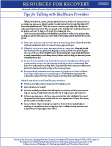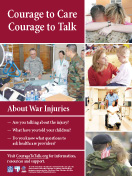 |
|
Tips for Talking with Healthcare Providers
Talking with doctors, nurses, and specialists about your loved one’s injury can be an overwhelming experience. Many families of combat injured warriors say they often don’t know what questions to ask! These are common concerns, especially when families are under great stress. Remember there are people in the hospital who understand how you are feeling, and want to help you through this challenging time.
Here are some tips for talking with healthcare providers as well as some questions that can help you get the information you need while in the hospital and throughout the recovery process.
- Have paper and a pen with you at all times to write things down. If you do not have anything handy, ask a doctor or nurse for some paper and a pen.
- If English is not your primary language, ask for an interpreter. Hospitals should have someone who can speak your language or bring a friend who speaks English who can assist you. Even if English is your primary language, many people find having a friend present helps to write things down for them and/or to help you hear and process everything that is said.
- Do not be embarrassed or shy to ask a doctor, nurse or healthcare professional to repeat, explain or say in simpler language anything you do not understand. You deserve to understand everything that is important about this injury as it effects your loved one’s treatment and your role in the recovery process.
- For any medical conversations of importance or length, try to obtain childcare for young children that are accompanying you. That way you can process the information and protect them from hearing something that might frighten them.
Helpful questions to ask healthcare providers:
- What can you tell me about my loved one’s condition now?
- How will he/she be treated?
- Are there medical procedures that will require my consent, and if so, can someone help me read and understand what I need to do to help you provide treatment.
- Is there a special person – doctor, nurse, social worker who will follow this case at the present time and communicate with me on a regular basis. What is their name, phone number and office location.
- Can you tell me what our family can expect in terms of recovery, disability, or anything we should know now to help each other (children, family members and injured warrior) help support each other?
|
|




